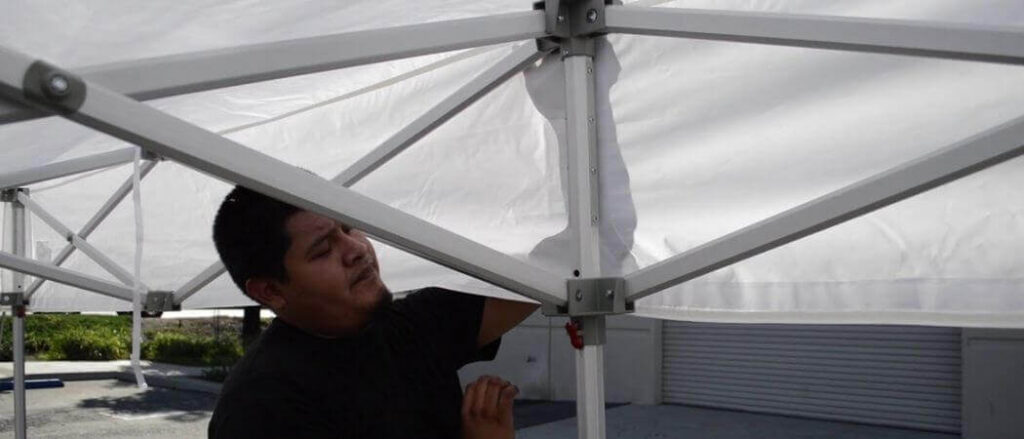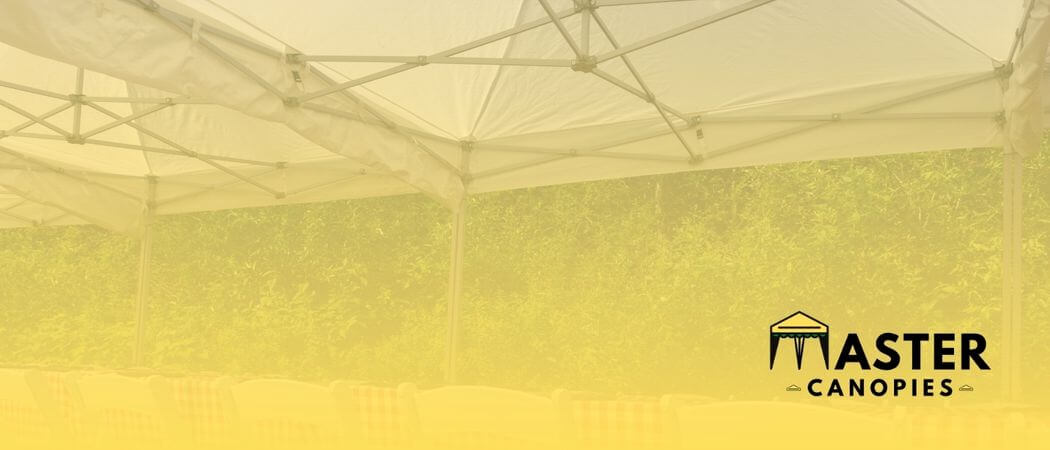Published June 14th, 2022 by Allen Campbell

Pop-up canopies are convenient but not very sturdy. They can’t handle the wind, rain, and uneven terrain as well as conventional tents do. Nevertheless, pop-up canopies are versatile and should be in everyone’s camping arsenal.
So how long do pop-up canopy tents last?
Depending on the fabric, use, and storage, pop-up tents endure 3 to 10 years. When not in use, store your pop-up tent in a dry, airtight container. One thing to keep in mind is that pop-up tents may rip in high winds.This article explains how durable pop-up canopies are, making yours last longer, and why they’re worth it. I’ll also explain why some people avoid pop-up tents and why they’re annoying.

Tents that “pop up” are not often famous for their durability. They are optimized for use in low wind and moderate temperature conditions during camping.
It is not suggested to set up a pop-up canopy if the ground is uneven or if there is a severe storm. To set up a pop-up canopy, you need to bring along sufficient supplies to weigh it down.
The following is a list of reasons why pop-up canopies are not considered durable:
Pop-up canopies may not be the most durable tents, but they are enjoyable and simple to use for novice campers. If you use one of them, you won’t need any prior knowledge of how to set up a tent.
Simply undoing the straps or knots and watching as it unfolds in front of you is all that is required. So keep on reading to learn how to enhance the lifespan of a pop-up canopy longer.
Are you concerned that you’ll need to purchase a new pop-up tent in a short amount of time? You may extend the life of your pop-up canopy by storing it properly and using it only when the weather is in the appropriate condition.
The fabric, inadequate care instructions, and other factors contribute to the estimated lifespan of three years. However, if you take care of your pop-up canopy, it has the potential to last as long as the high end of the estimate of 10 years.
But, there’s no single answer to how long your pop-up canopy will last.
The question now is, what can you do to extend the lifespan of a pop-up tent to at least ten years?
If you follow the advice above, there is absolutely no question that you will be able to enhance your pop-up tent and make it more durable. Yet, despite this, a large number of campers choose not to use these convenient tents. But why on earth wouldn’t someone want a tent that pops up?
Some people avoid using pop-up canopies since these tents are not constructed to last as long as conventional tents, their fabric is weaker, and most pop-up tents do not have any kind of treatment to protect them from rain or UV radiation.
You can protect your tent from the sun’s ultraviolet rays with UV spray, and you can keep water out of your tent with waterproofing spray; however, some people want these features built-in.
As you’ve seen throughout the rest of this article, pop-up canopies are not as durable and dependable as conventional tents. Therefore, a pop-up tent is not going to be the best option for you if you are an experienced camper who enjoys braving the weather and camping in challenging environments. They don’t even come somewhat close to matching the quality of a regular tent.
You can protect your tent from the sun’s ultraviolet rays with UV spray, and you can keep water out of your tent with waterproofing spray; however, some people want these features built-in.
Pop-up canopies are designed to be as convenient as possible, and one of the ways they accomplish this goal is by reducing the amount of inside space. As a result, some of these tents weigh little more than a handful of pounds, while others weigh even less than that.
If you aren’t bothered by sleeping in a tent that’s on the smaller side, this problem may not be as big of a bother for you. The good news is that there are numerous pop-up tents designed specifically for families that are meant to be somewhat larger.
Pop-up canopy tents are worth the investment if you want a fun tent to use a few times a year in warm weather. They’re an excellent starting point for folks who have never gone camping before. In addition, they won’t have to worry about setting up a complicated tent since most pop-up tents can be put up in less than a minute.
Here are some additional reasons why pop up tents are worthwhile:
While pop-up canopy tents are not intended for use in all four seasons, they are ideal for rapid camping plans in mild weather. You may use a pop-up tent to extend the life of your main tent by alternating how often you use them. Because pop-up tents are intended for low breezes and no rain, they will not endure winds above 10 miles per hour.
I hope this article answers your question of ‘how long do pop-up canopy tents last?’ Best of luck!

Allen is a full time writer at Mastercanopies.com and enjoys traveling around the United States and exploring nature. He enjoys writing about canopies as he believes they are extremely crucial in having a successful camping trip whether it be a trip to the beach, mountains, or the open plains.

Can You Put a Tent in the Dryer Safely? Published February 4th, 2023 by Allen Campbell Well, it’s no secret that a tent is a

How to Print on a Canopy: How to Print Custom Images/Logos Published February 4th, 2023 by Allen Campbell Do you want to print something special

How to Choose the Best Outdoor Event Flooring for your Next Celebration Published January 31st, 2023 by Allen Campbell Planning an outdoor event can be

How to Insulate a Tent for Winter and Keep Warm Published February 3rd, 2023 by Allen Campbell Is your tent the last frontier when it

Wolfwise Beach Tent Review: Should You Buy It? Published January 23rd, 2023 by Allen Campbell Are you planning a beach vacation but don’t know exactly

How to Start a Tent Rental Business (and have Success with It!) Published January 23rd, 2023 by Allen Campbell Do you have a knack for

Wolfwise Beach Tent Instructions: Easy Setup Guide Published January 23rd, 2023 by Allen Campbell Let’s face it, setting up a beach tent can be tricky…

Best 100×100 Tents for Large Gatherings and Parties Published January 12th, 2023 by Allen Campbell Finding the right tent for your next event can be

Best Tent Rentals in Downers Grove, IL Published January 12th, 2023 by Allen Campbell Hoping to make a big impact in Downers Grove? Well, if

Master Canopies is here to bring you the best canopies for the outdoors so that you can enjoy the fresh air without the gleaming and burning light of the sun.

Master Canopies is here to bring you the best canopies for the outdoors so that you can enjoy the fresh air without the gleaming and burning light of the sun. As an Amazon Associate, we earn from qualifying purchases.